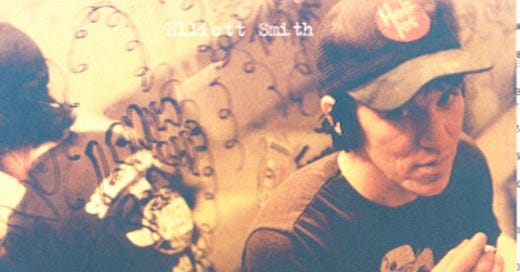When I look back at musicians that left the stage early, there were several in my youth: Kurt Cobain, Richey Edwards of The Manic Street Preachers, Jeff Buckley, Tupac and Biggie. The trouble was when all of these people died,1 I was unfamiliar with their music or even just with them, and I didn’t notice them like I did Freddie Mercury’s death in 1991, which was all over the news to the degree that not even an 8-year-old could fail to pick it up. By age 18, I knew many more, from Jimi Hendrix and Janis Joplin to Ian Curtis and Nick Drake, that predated my existence, never mind my consciousness.
The first one I remember, as someone who I remember being alive and making music that I was reasonably familiar with and then one day, they weren’t, was Elliott Smith.2
I first learned about Smith’s death when, before a day of lectures at University, I popped onto a PC to read various websites and forums and the news on the NME website. It wasn’t the first time I’d read of someone noteworthy dying on the internet; the first was Princess Diana. In the modern age, it is usually Twitter or a breaking news alert that has notified me of hundreds, thousands even since, and it is striking to me that this is one I remember well as it was a novel way to receive news still in 2003.
Smith’s third album, Either/Or, was released almost seven years before that, in February 1997. A year later, Gus Van Sant included three songs from the album in the film Good Will Hunting and the new song ‘Miss Misery’ which Smith performed at the 1998 Academy Awards backed by the house band.
‘Between The Bars’ and ‘Angeles’ were joined on the soundtrack by Either/Or closing song, ‘Say Yes’. In the context of the film, the song is playing when Minnie Driver’s Skylar and Matt Damon’s Will share their first kiss, so it comes at a beginning. Even though it is a final song, the references to the girl who is still around the morning after (a one-night stand) could give you the sense that it is appropriate to be soundtracking the start of something.
The song was written about Smith’s ex-girlfriend, Joanna Bolme, and expresses Smith's desire to reconcile with her. It is a departure from the melancholy tone of the other 11 songs on the album and has a much more upbeat melody and optimistic lyrical content. For those that are familiar with Smith’s earlier work, they can pick out a guitar lick that interpolates the closing track of Smith's self-titled album, ‘The Biggest Lie’ This intentional callback suggests that ‘Say Yes’ represents a moment of emotional growth for Smith as he expresses hope for the possibility of rekindling his relationship with Bolme. There’s a lot to be said for the idea that many of Smith’s songs are about dependency on drugs, drink and other people. Those are combined here as that reliance on Bolme is juxtaposed as a metaphorical hangover with the literal one Smith invokes.
Smith told SPIN in 1998 that;
I wrote that song in five minutes. And I wrote ‘Between The Bars’ right after that. Both of those I made up during an episode of Xena: Warrior Princess with the sound off, which is a great way to write songs.
You can hear that shortcut to simplicity, the fragile whisper and the lack of other instrumentation that isn’t the acoustic guitar. The song's clarity and optimism are reminiscent of The Beatles' ‘All You Need is Love’, the closing track on Magical Mystery Tour. Smith listened to this album daily while recording Either/Or; the parallels between the two songs are no coincidence. Both songs employ straightforward, positive messaging to give closure to their respective albums, and the way that Smith sings, the optimism of the plea to reply in the affirmative, makes it clear that he sees a way forward because love is all you need.
Edwards was declared dead in absentia in 2008, he has now been missing for over 28 years.
Aaliyah and Lisa "Left Eye" Lopes are probably contenders for this as well, but I can’t say I was overly familiar with as much of their work as I was with Smith at the point they died.




